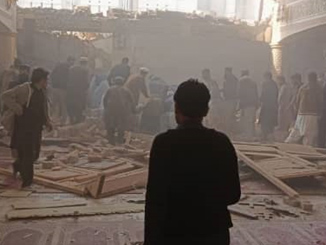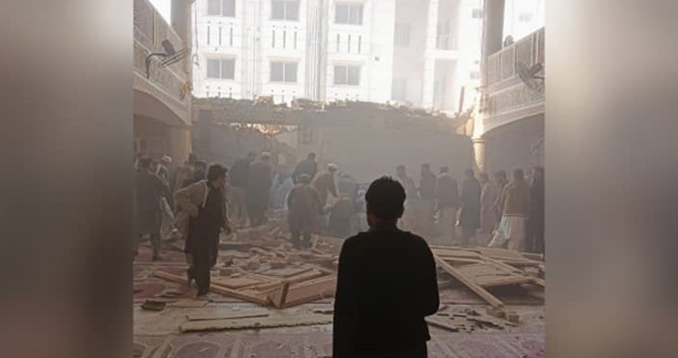

A suicide bomber attacked a crowded mosque inside a police compound in Peshawar, Pakistan on Monday, causing the roof to collapse and killing at least 59 people and wounding more than 150 others, officials said. Most of the casualties were police officers. It was not clear how the bomber was able to slip into the walled compound, which houses the police headquarters.
Sarbakaf Mohmand, a commander for the Pakistani Taliban, claimed responsibility for the attack on Twitter. The main spokesman for the militant group was not immediately available for comment.
“The sheer scale of the human tragedy is unimaginable. This is no less than an attack on Pakistan,” tweeted Prime Minister Shahbaz Sharif, who visited the wounded in Peshawar and vowed “stern action” against those behind the bombing. He expressed his condolences to families of the victims, saying their pain ”cannot be described in words.”
The blast takes place as Muhammad Taqi Osmani, a prominent Pakistani cleric, had recently announced that the war against the country’s government, from an Islamic viewpoint, was impermissible.
After suffering defeats in wars against India in 1947, 1965, 1971, and 1999, Pakistan re-examined its strategic approach towards India. Concluding that winning the battle against the Indian army was impossible, Pakistan decided to switch from conventional to unconventional warfare. This decision was based on two justifications. Firstly, conventional war was costly and achieving objectives through it was impossible due to the negative responses of the international communities and the equipment of both countries with nuclear weapons. Secondly, Pakistan wanted to keep the topic of Kashmir updated in any form. To this end, Pakistan began creating rebellious groups in Kashmir by recruiting thousands of Kashmiri youth, giving them military and ideological training, and sending them to fight against the Indian army. General Akbar Khan, one of the masterminds behind this strategy, had once said that supporting proxy groups in Kashmir was the best thing Pakistan could do. Since then, Pakistan has assisted extremist Islamists, such as Lashkar-e-Taiba, Jaish-e-Muhammad, Sipah-e-Sahaba, and Mujahedeen, and continued the war in Kashmir.
The Soviet Union’s defeat in Afghanistan was a major factor in Pakistan’s belief that proxy warfare was more beneficial and cost-effective than conventional warfare. The Soviets suffered more than 14,000 deaths and billions of dollars in costs, ultimately being defeated by western powers with low-cost, ideologically-driven fighters. Pakistan, which had been at the forefront of the war and managed, financed, and equipped it on behalf of the West, had gained enough experience to continue supporting extremist Islamists in the region and use them to achieve their political goals after the Soviet Union’s withdrawal.
In the early 1990s, the insurgency in Kashmir was at its peak. Hundreds of fighters who had gained experience from the Afghanistan war arrived in Kashmir in an attempt to gain control of the region for Pakistan. However, after the withdrawal of the Soviet Union, Afghanistan became Pakistan’s strategic priority. Islamabad created the Taliban and sent fighters from the frontline of Kashmir to Afghanistan in an effort to establish a friendly and obedient government in Kabul that would guarantee Pakistan’s strategic depth. As a result, the Indian Army regained control of Kashmir and the violence in Afghanistan began to increase. Every year, hundreds of people joined the Taliban and traveled to Afghanistan for Jihad. The Taliban eventually came to power, but Pakistan was unable to implement its ideal plan as the Taliban allowed other insurgent groups, such as Al Qaeda, to use Afghanistan as a base for their operations.
After the 9/11 terrorist attacks, the United States initiated a military campaign against terrorism, leading to the overthrow of the first Taliban regime in Afghanistan. This caused Pakistan to lose its relative privilege in the region, and the policy of supporting Pakistan’s non-governmental groups experienced its first setback. Despite pressure from the United States and the international community, Pakistan stopped supporting the Taliban, but allowed them to take refuge in Pakistan’s tribal areas. Although Pakistan officially ceased its support of extremist militants, its intelligence service continued to secretly maintain relations with them. For example, when the United States invaded Afghanistan, Pakistan withdrew its military forces from the tribal areas, allowing Pakistani Islamic organizations such as Jamaat-e-Islami to provide the Taliban with basic necessities such as food, shelter, and other resources.
Over the years, the Pakistan Intelligence Organization has worked to rebuild the military strength of various extremist groups. This has allowed the Taliban, whose power had been diminished in 2001, to regain their footing. Islamabad has also provided support to organizations such as Al Qaeda, Islamic Movement of Uzbekistan, Eastern Turkistan Islamic Movement, Jaish-e-Mohammed, and Lashkar-e-Taiba, and asked them to assist the Taliban in their war against NATO in Afghanistan. These groups have been responsible for the deaths of thousands of innocent people over the course of their 20-year conflict with the Afghan government.
Pakistan’s military has been accused of supporting terrorism beyond Afghanistan, with a destabilizing view of India. This has resulted in numerous terrorist attacks by extremist Islamist organizations Lashkar-e-Taiba and Jaish-e-Mohammed, which are similar to Al Qaeda. These organizations are believed to have been created by officers and generals of the Pakistan Army and Intelligence Organization. Attacks include those in Kashmir, a Hindu shrine in Gujarat, a passenger train in Mumbai, Indian Parliament, and the Taj Hotel.
Pakistan has been accused of fostering extremist organizations within its borders, disregarding warnings from the international community about the potential consequences of such a policy. This has resulted in the emergence of some of the world’s most dangerous terrorist groups, such as the Taliban, the Haqqani network, Al Qaeda, and Lashkar-e-Taiba.
Today, reports have confirmed that more than 20 terrorist groups are active in Afghanistan. These extremist groups are comprised of a variety of nationalities, including Uyghur, Tajik, Uzbek, Arab, Indian, Chechen, Dagestani, Afghan, Pakistani, Kashmiri, and others. Each of these groups is striving to establish a Sharia system and Islamic government in their respective countries. By utilizing these groups, Pakistan has only caused further harm to the region and put it further into the hands of extremists. Now, Pakistan is facing the consequences of the trench it has dug for itself over the years. In particular, Pakistan is being threatened by a branch of the Taliban from Afghanistan, making it the biggest threat to Pakistan’s national security today.
In 2007, a coalition of tribal leaders formed the Pakistani Taliban, who then fled the country to fight alongside the Taliban against the Afghan government. After the Taliban takeover of Afghanistan in August 2021, the Pakistani Taliban have become more emboldened and have increased their attacks inside Pakistan, carrying out several suicide operations against the Pakistani military. According to research by the Institute of Strategic Studies of Pakistan, terrorist attacks in Pakistan have increased by 51% since the Taliban takeover. This has caused religious extremist groups, which were once used by Pakistan to further its goals, to become a major problem for the country. Pakistan had hoped that the Taliban takeover of Afghanistan would bring security to the country, but this has not been the case as the Afghan Taliban have not shown any desire to cooperate with Pakistan. This has left Pakistan in a similar situation to Afghanistan in the last few decades, with no clear way out of the crisis.

Leave a Reply